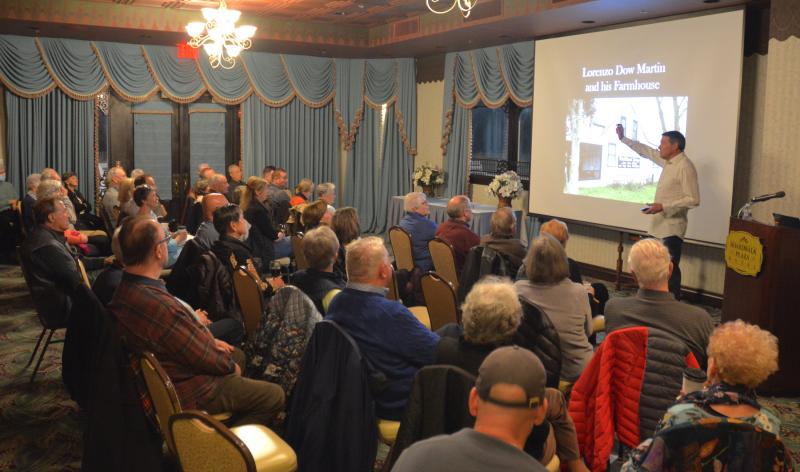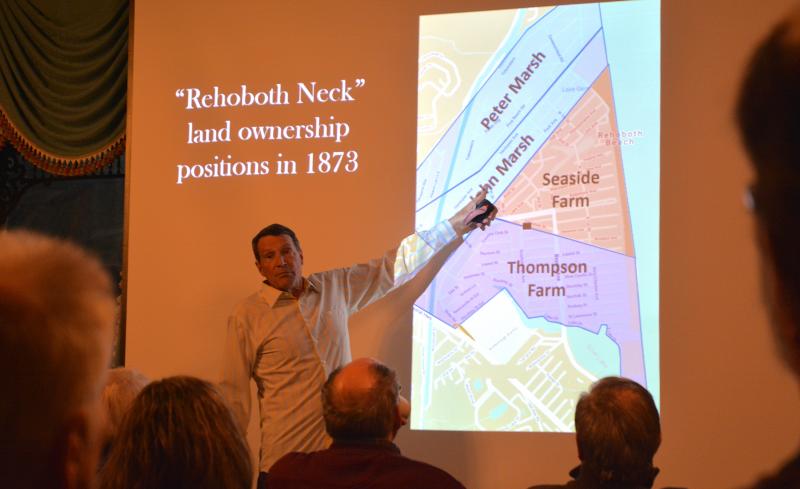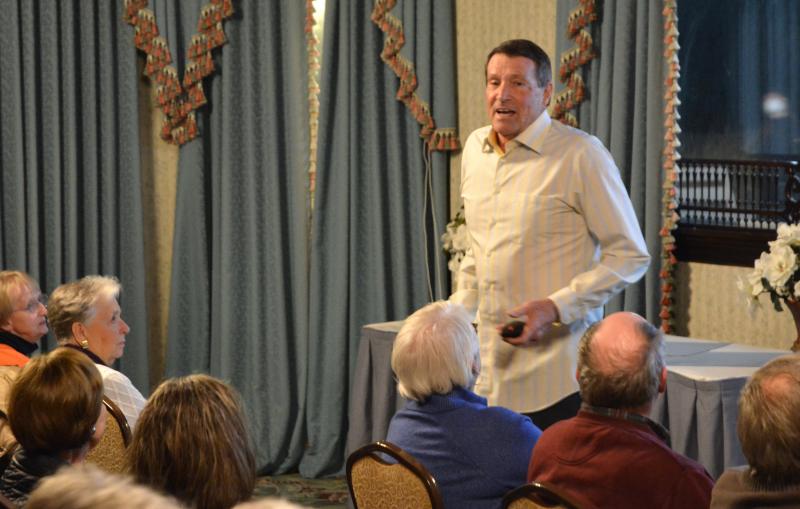In his time, Lorenzo Dow Martin was king of Rehoboth Beach
Ever wonder how Cranberry Park, located on the western prong of Lake Gerar in Rehoboth Beach, got its name?
Addressing a roomful of people March 10 at the Boardwalk Plaza Hotel, Rehoboth Beach historian Paul Lovett said the name recognizes Lorenzo Dow Martin’s cranberry-growing operation in that area decades before the city was founded in 1873. Martin had heard farmers in New Jersey were making good money growing cranberries, and he thought he could do the same thing in Lake Gerar, said Lovett.
Lovett has spent all of his life just feet from the Lewes-Rehoboth Canal. His family has owned property on the east side of the canal on Canal Street since the 1950s. Over the last handful of years, he has painstakingly created a diorama of the city as it looked in the early 1900s.
Now, as part of his continued desire to preserve Rehoboth Beach history, Lovett is hosting a four-part lecture series on the city’s history. Martin’s life and his contributions to the founding of the city were the subject of Lovett's first lecture.
Situated on the corner of Christian Street and Scarborough Avenue, Martin’s former farmhouse is Rehoboth Beach’s oldest structure. Lovett said the house’s existence was first recorded in 1836, when it was described as being included on the land of a farm for sale called Seaside Farm. Martin purchased the farm in 1848, said Lovett. The property is now owned by the Jack Lingo Realtor family, but it was previously home to the Walls’ Apartments complex owned by Ann Walls McCool, who operated vacation apartments and cottages for several decades.
Martin was born in Milton in 1810 and married his wife Kitty in 1829, said Lovett, who speculated that Martin was named after Lorenzo Dow, a popular preacher of that era. There’s not much available information about Martin until he purchased the farm, Lovett said.
Lovett described the triangular piece of land Martin purchased as essentially encompassing all of the city’s current commercial district. He said its boundaries ran along the ocean from what is now Lake Avenue south to Philadelphia Street and diagonally out to where those two lines meet, running southwest along what is now Lake Avenue and northwest along the combination of Philadelphia Avenue and Christian Street.
Martin eked out a living on his farm, which would have had horses, goats, chickens, cats and dogs, for nearly 40 years, said Lovett.
Ultimately, Martin sold the farm to a Wilmington-based reverend named Robert W. Todd, who is credited with turning the farmland into the camp meeting association. Martin purchased the property for $135 and sold it to Todd for $5,000, said Lovett.
From the very beginning, Todd appreciated the area, said Lovett. Todd described the property as “one of the finest watering places in the world,” he said.
Todd conducted the initial lot lottery for Rehoboth Beach in May 1873, and the first lot sold was 23 Surf Ave., which is where the Atlantic Sands stands now, said Lovett.
Martin’s contribution to the founding of the city didn’t go unnoticed at the time. Lovett showed a slide of Martin’s obituary from 1926, where he was described as king of Rehoboth. Martin and his wife Kitty are buried in the cemetery at the Midway Presbyterian Church on Route 1 across from Atlantic Liquors, said Lovett, showing another slide of the headstones.
Future lectures for the series
Lovett will host three more lectures for his series on Rehoboth Beach history – Thursday, April 14, will feature the premiere of a movie on 98-year-old Kitty Cole, who has lived in Rehoboth her whole life; Thursday, May 12, will be a discussion on Commodore William H. Shock, who had a distinguished naval career before being one of the city’s founding fathers; Thursday, June 9, will be about the wealthy barons of industry who built cottages on the Boardwalk in the 1880s.
All the lectures begin at 7:15 p.m. and take place in the Kent/Sussex Room of the Boardwalk Plaza Hotel, 2 Olive Ave. The cost of each lecture is $25. To reserve a seat, call 302-521-4190.
Chris Flood has been working for the Cape Gazette since early 2014. He currently covers Rehoboth Beach and Henlopen Acres, but has also covered Dewey Beach and the state government. He covers environmental stories, business stories and random stories on subjects he finds interesting, and he also writes a column called Choppin’ Wood that runs every other week. He’s a graduate of the University of Maine and the Landing School of Boat Building & Design.
























































